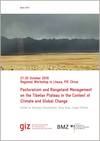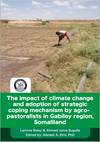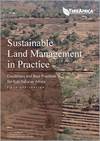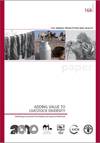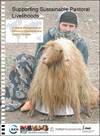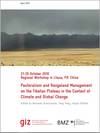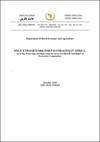This publication contains the keynotes and case studies that were presented in the plenary sessions of the regional workshop on pastoralism and rangeland management in the Tibetan Plateau in the context of climate and global change. With this publication, the authors attempt to reach a wider readership that has an interest in the changes, challenges and transformations in pastoralism and rangeland management. Some of the key concepts, designs for modernisation and aims for the immediate future in the rural areas of the Tibetan Plateau are presented here in a concise and easily approachable manner by leading experts in the respective fields.
Year of publication: 2011Organization: Sociedad Alemana de Cooperación Internacional (GIZ)
Topic: Cambio climático, Servicios ambientales, Tierra, Resiliencia, Valeur ajoutée
Language: English
Type of document: Técnico
Geographical coverage: Asia Central, Asia Meridional
Despite worldwide coverage of climate change impact, there is inter and intra-sectoral variation in vulnerability depending on location, adaptive capacity and other socioeconomic and environmental factors. In Somaliland, adverse impacts of climate change include recurrent droughts, increased biodiversity loss, species migration and encroachment of invasive plants, increased rural urban migration, changes in the vegetation types, soil fertility loss, and increased infestation of crop by pests and diseases and increased health risks.
This publication presents case-studies documented by Candlelight for Health, Education and Environment, focusing on how climate change is impacting the pastoral communities and environment as a whole in the different ecological zones of Somaliland.
Year of publication: 2011Organization: Autores individuales
Topic: Cambio climático, Resiliencia
Language: English
Type of document: Técnico
Geographical coverage: África Oriental
These guidelines for best sustainable land management technologies and approaches are made for practitioners, managers, policymakers, planners, together with financial and technical institutions and donors. They are divided into two main parts. Part 1 highlights the main principles behind sustainable land management, and what considerations are important for technologies and approaches to qualify as ‘best practices’ suitable for upscaling. Part 2 presents twelve groups of sustainable land management technologies as well as a section on sustainable land management approaches. The focus is, in particular, on those practices with rapid payback and profitability and/or other factors that drive adoption.
Year of publication: 2011Organization: Organización de las Naciones Unidas para la Alimentación y la Agricultura (FAO), Reseña mundial de enfoques y tecnologías de la conservación (WOCAT),
Topic: Tierra
Language: English, Français
Type of document: Técnico
Geographical coverage: África Occidental, África Central, África Oriental, África Meridional
El mercadeo en nichos puede ofrecer oportunidades para la producción sostenible en las zonas marginales y puede mejorar los medios de subsistencia de los pastores y de las personas involucradas en la elaboración y comercialización de los productos. Puede también ser especialmente beneficioso para las mujeres y los pobres. También puede ser una herramienta para la conservación de las razas. Este libro describe ocho casos en África, Asia y América Latina donde mediante intervenciones externas se ha intentado desarrollar productos especializados derivados de las razas autóctonas.
Year of publication: 2011Organization: Organización de las Naciones Unidas para la Alimentación y la Agricultura (FAO), Unión Internacional para la Conservación de la Naturaleza (IUCN), , Liga de Comunidades de Pastores (LPP)
Topic: Economía, Valeur ajoutée
Language: English, Français, Español
Type of document: Técnico
Geographical coverage: Global
Estas directrices han sido elaboradas para ayudar a los responsables de la toma de decisiones, que quizás no intervienen habitualmente en cuestiones relacionadas con el pastoralismo, a tomar mejores decisiones con respecto a las políticas e inversiones que afectan a los pastores y sus entornos. Si bien algo técnicas, pretenden simplificar asuntos complejos o polémicos en conceptos básicos más funcionales. Las directrices han sido diseñadas para ayudar a los expertos del desarrollo y la conservación a familiarizarse con los principios fundamentales del pastoralismo y con algunas de las oportunidades y limitaciones del desarrollo sostenible.
Year of publication: 2011Organization: Unión Internacional para la Conservación de la Naturaleza (IUCN)
Topic: Economía, Servicios ambientales, Seguridad alimentaria, Tierra, Organización, Participación
Language: العربية, 漢語, English, Français, Русский, Español
Type of document: Técnico
Geographical coverage: Global
“Nosotras, las mujeres pastoras reunidas en Mera, en la India, del 21 al 26 de noviembre de 2010, en representación de 32 países, nos hemos reunido para fortalecer alianzas e impulsar soluciones prácticas para problemas que nos afectan.”
“Presentamos esta declaración como un documento político para informar y apoyar de políticas pastoriles.”
Year of publication: 2010Organization: Autores individuales
Topic: Género y juventud, Participación
Language: English, Français, Español
Type of document: Políticas y legislación
Geographical coverage: Global
The regional workshops within the mountain development programme of InWEnt aim at addressing pressing problems of mutual interest among the participating partners by focusing on a specific topic. In 2010 two conferences on pastoralism were held in the framework of the mountain development programme. Complementing the series that started with the Khorog and Kashgar workshops in July the Lhasa gathering happened to be the final part with a special focus on pastoralism and rangeland management on the Tibetan Plateau. It seems to have been the appropriate timing to emphasize upon a pressing issue that is generating increased and rejuvenated interest in the debates on biodiversity, climate and global change. Planners are challenged by designing concepts for nature protection and resource management in order to implement “green policies”. Decision-makers keep in mind the dual challenges between livelihood improvement and natural resource management by translating and transferring it into modernisation programmes. Far-reaching policies that aim at a reconciliation between ecological necessities and economic demands are tested and implemented in a grand design. Especially the Tibetan Plateau is an arena where the term eco-shelter has become a specific meaning that is affecting the reconciliation between nature and society as well as leading to far-reaching transformations in settlement structures and economic strategies. Recent interventions have changed and modified pastoral practices, terminated and extinguished certain traditions and opened-up new hitherto unknown and unexpected opportunities for pastoralists on the Tibetan Plateau. On the vast Tibetan Plateau pastoralism and rangeland management are not only challenges for regional planning, both sectors offer a tremendous economic potential and are proof for the adaptive properties and resilience of pastoralists exposed to harsh environmental conditions and all kinds of changes.
Year of publication: 2010Organization: Autores individuales
Topic: Cambio climático
Language: English
Type of document: Técnico
Geographical coverage: Asia Central
The Policy Framework for Pastoralism in Africa is the first continent-wide policy initiative which aims to secure, protect and improve the lives, livelihoods and rights of African pastoralists. The policy framework is a platform for mobilizing and coordinating political commitment to pastoral development in Africa, and emphasizes the need to fully involve pastoralist women and men in the national and regional development processes from which they are supposed to benefit. The framework also emphasizes the regional nature of many pastoralist ecosystems in Africa and therefore, the need to support and harmonize policies across the Regional Economic Communities and Member States.
Year of publication: 2010Organization: Oficina Interafricana de Recursos Animales (AU-IBAR)
Topic: Seguridad alimentaria, Pueblos indígenas, Organización, Participación, Servicios sociales
Language: English
Type of document: Políticas y legislación
Geographical coverage: Norte de África, África Occidental, África Central, África Oriental, África Meridional


